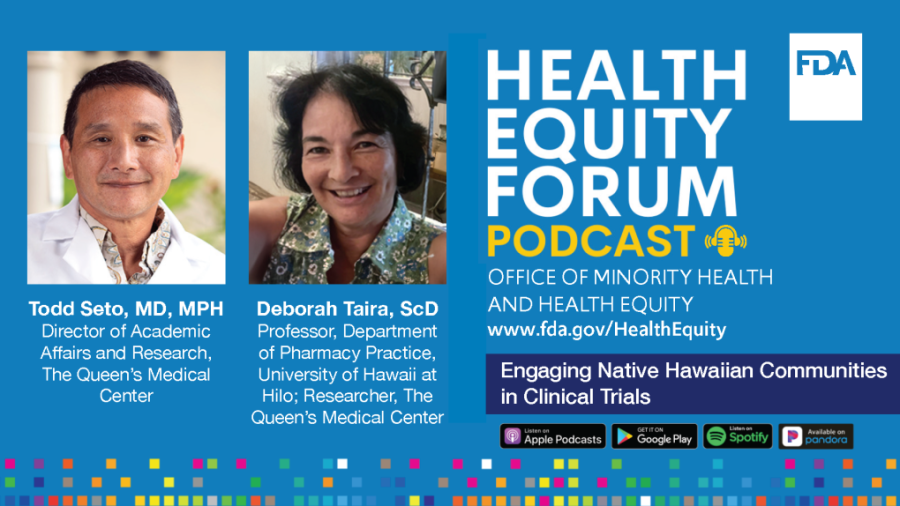Dr. Taira discusses Hawaii health equity issues in new FDA podcast
May 13, 2024
 A new FDA podcast is now available.
A new FDA podcast is now available.
To recognize May as Asian American, Native Hawaiian and Pacific Islander Heritage Month, the FDA Office of Minority Health and Health Equity has released a new episode of its Health Equity Forum podcast, which features DKICP Professor Deb Taira, who also serves as a senior scientist at The Queen’s Medical Center in Honolulu.
Titled “Engaging Native Hawaiian Communities in Clinical Trials,” the podcast focuses on research conducted by Taira and Dr. Todd Seto, a practicing cardiologist, director of academic affairs at The Queen’s Health System, and professor and vice chair of the the department of medicine at the University of Hawaiʻi John A. Burns School of Medicine. Their research aims to address and reduce health disparities experienced by people in the Native Hawaiian and Pacific Islander communities within the state.
“Hawaiʻi residents, overall, have the highest life expectancy of any state in the U.S., but there are huge disparities between Native Hawaiian life expectancies and those of residents of Asian ancestry, for instance,” says Taira. “I’m passionate about doing what I can to help correct that.
“For Native Hawaiians and Pacific Islanders, there has been a long history of invisibility,” she notes. “They’ve often been grouped with Asian Americans or in another race category. So when you look at clinical trials that have been conducted, it’s almost impossible to get data on those two specific ethnic groups. And yet, in the case of diabetes, the prevalence of the disease among those two groups is very high.”
The researchers’ current project involves building the necessary infrastructure for clinical trials, she explains. “We’ve just completed a pilot study where we interviewed Native Hawaiian, Pacific Islander, Filipino and white patients who were hospitalized with diabetes, to determine their trust level in their physicians, beliefs about their medications, whether they’d be willing to participate in a clinical trial and what types of support they would need to do so.”
One important finding: Better communication with those two groups is needed by medical professionals in order to gain the trust of patients enrolled in clinical trials. “We’ve found most patients have enormous trust in their healthcare providers, so engaging with primary-care physicians and specialists is essential,” says Taira. “We need outreach and education for the primary care providers, and some of that could be done through curriculum at the the John A. Burns School of Medicine at the University of Hawaiʻi.”
Language challenges are also more prevalent among Pacific Islanders, Taira adds. “These patients can originally be from American Samoa, Western Samoa, Guam, Chuuk, Pompeii or Fiji. For many of them, English was not their first language. In some cases, they may not understand what a clinical trial is, so outreach to these groups needs to be much different.”
She says they’ve been encouraged by the level of interest they’ve seen from Native Hawaiian and Pacific Islander patients in being involved in clinical trials. “It’s been overwhelmingly positive so, going forward, we hope to take advantage of that momentum and build on it.”
See more news from 2024.

